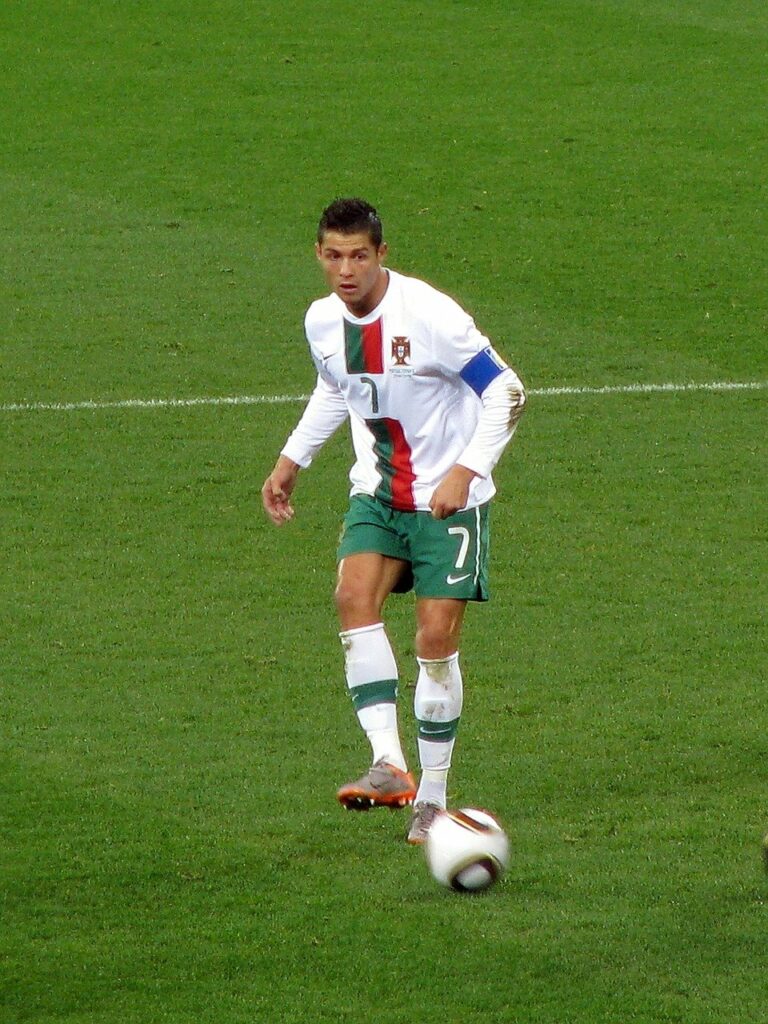“That guy looks exactly like Saylaw!”
“Like who?”
“Saylaw, the football player, you know?”
“Who?
“He’s one of the most famous players of all time! From Portugal, I’m sure you know about him.”
“You mean Ronaldo?”
Understanding language requires you to extract information from what is said or written, then combine it with what you already know; reconciling the two is called comprehension.
When learning a new language, this process is far from perfect and learners will often fail to extract some of the information available, sometimes most of it if the language is far above our level. Learning to read in Chinese presents a challenge, but listening is hard as well.
Beyond the obvious challenges of learning characters and learning to hear the sounds and tones, you need to know most of the words used and you need grammatical structures to slot them into a framework to make sens of them.
Tune in to the Hacking Chinese Podcast to listen to the related episode:
Available on Apple Podcasts, Google Podcast, Overcast, Spotify and many other platforms!
However, there’s more to it than that. Like I said above, to understand you also need to reconcile what someone says or writes with what you already know. Text or speech doesn’t contain all the information you need to make sense of it, and so the writer or speaker counts on you knowing certain things in advance. This gives rise to a problem that is not unique for learners of Chines, but is certainly more serious than when learning languages more closely related to English.
Lost in transcription: Saylaw, Ice Island and Aristotle
Let’s take a look at the dialogue shown at the beginning of the article again:
A: “That guy looks exactly like Saylaw!”
B: “Like who?”
A: “Saylaw, the football player, you know?”
B: “Who?
A: “He’s one of the most famous players of all time! From Portugal, I’m sure you know about him.”
B: “You mean Ronaldo?”
This is a hypothetical but realistic breakdown in communication between a Chinese speaker (person A) and an English speaker (person B). It could also have been in Chinese, again with the Chinese speaker first and the other person being a second language learner. I recorded this dialogue in Chinese for the podcast episode; check it out here.
A: 那个男生长得跟C罗一模一样耶!
Nàge nánshēng zhǎng de gēn Sēiluó yìmúyíyàng yē!B: 跟谁一模一样?
Gēn shéi yìmúyíyàng?A: C罗,踢足球的那个啊!
Sēiluó, tī zúqiú de nàge a!B: 谁?
Shéi?A: 你不知道吗?他是现在最有名的球星啊,葡萄牙的那个,你肯定知道!
Nǐ bù zhīdao ma? Tā shì xiànzài zuì yǒumíng de qiúxīng a, Pútáoyá de nàge nǐ kěndìng zhīdao!B: 你是说Ronaldo吗?
Nǐ shì shuō Ronaldo ma?
Let’s look at what happened here and then zoom out to the more general problem. The Portuguese football player Cristiano Ronaldo is usually called “C罗” in Chinese (rendered as “Saylaw” in the dialogue to approximate how most Chinese people would pronounce it, although “Seelaw” is maybe more common in Taiwan). If you’ve never heard it before, it’s very unlikely that you realise that C罗 refers to Ronaldo.
 On the face of it, the name looks weird, so let’s have a closer look before we continue. There are many football players called Ronaldo (Wikipedia lists a whooping eleven), so using the first letter in his personal name and then 罗 (luó) as short for Ronaldo makes sense: C罗.
On the face of it, the name looks weird, so let’s have a closer look before we continue. There are many football players called Ronaldo (Wikipedia lists a whooping eleven), so using the first letter in his personal name and then 罗 (luó) as short for Ronaldo makes sense: C罗.
Different languages, different labels
The reason communication broke down in the example above is that even though both people clearly knew who Cristiano Ronaldo is, they used names for him that were different enough that the listener was unable to draw on prior knowledge to make sense of the utterance.
The learner is lost in transcription, which is what this article is about. It could be argued that the same is true for words in general, but while everybody knows that words are different in different languages, people often don’t realise that even something like a person’s name can vary too.
This problem is common for people learning Chinese in two ways:
- A Chinese person refers to something you think you don’t know what it is, but you then realise that you actually do know, it’s just that the names were different enough that you were unable to make the connection. This is the C罗 example from the dialogue.
- When speaking Chinese yourself, you refer to a name in English or another non-Chinese language, and the Chinese person you’re talking with doesn’t understand what you mean, even though they would have if you had used the right name in Chinese. This would be the case if you said “Ronaldo” when a Chinese person only knew about “C罗”, even though this is probably less likely than the reverse.
This is Hacking Chinese, so while this problem exists between languages in general, I’m going to focus on Chinese, and mostly from the perspective of second language learners like myself.
Foreign names in Chinese
The rendering of foreign names in Chinese differs a lot more than in many other languages because of the fact that Mandarin doesn’t have all that many syllables and that characters with a fixed pronunciation are used to write the names. This leads to the same type of pronunciation problem that I discussed in another article about why you shouldn’t think of Chinese pronunciation in terms of English words, or vice versa:
Why learning Chinese pronunciation by using English words is a really bad idea
So, foreign names rendered in Chinese often do not make sense to second language learners just by looking at them. This is not always the case, of course, and you can often guess what a name refers to even the first time you encounter it.
If someone says that they love the music of 贝多芬 (bèiduōfēn) and you fail to realise it’s about the old Ludwig van, then that’s on you, because bèiduōfēn really does sound quite similar to Beethoven. Likewise, if a person says they work in 巴拿马 (bānámǎ), you need to be very close-minded to fail to figure out that that’s Panama.
It’s worth noting here that cases that really don’t make any sense usually entered Chinese via some other topolect than Mandarin and therefore only make sense in that variety of Chinese.
For example, my native country Sweden is called 瑞典 (ruìdiǎn) in Mandarin, which makes more sense when you see that it’s seoi6din2 in Cantonese. That’s pretty close to how Sweden is pronounced in English. In Mandarin, those characters are pronounced ruìdiǎn, which is not as good. This is quite common.
If you want to learn more about how names are transcribed into Chinese, this page over at Wikipedia is a good start.
Nigeria? Never heard of it! Oh, you mean Nírìlìyà?
When speaking Chinese, you can also run into the opposite problem, so if you say “Beethoven” with German (or English) pronunciation in the middle of a Chinese sentence about music, it’s likely that Chinese people will understand what you mean, provided they know about Beethoven. Same thing with Panama pronounced in Spanish (or English).
However, this doesn’t always work. Actually, it rarely works unless the person you’re speaking with is cosmopolitan enough to be used to talking to foreigners like you. This can be quite frustrating at times.
Even though it sounds silly, you can sometimes sinicise the name on the fly and make it work. For example, if you say “Nigeria” in English in the middle of a Chinese sentence, people might not understand you. How can you make it sound more Chinese? Try to say it using only valid syllables in Mandarin before reading on.
If we go by English pronunciation, ni ji ri ya, perhaps? All those are valid syllables in Chinese and it sounds like Nigeria, or at least it does to me.
The actual answer is 尼日利亚 (nírìlìyà), but I think it’s not unreasonable to assume that your version might work in context. The official name in Taiwanese Mandarin is actually 奈及利亞 (nàijílìyà), which is even closer.
Naturally, this will not always work, but I know from personal experience that my made-up Chinese versions of place names are sometimes more likely to be understood than their English equivalents. If you’ve studied Chinese for a while, you will have also built up a natural feel for how languages are transcribed. Or you can just look it up.
There being several different names in Chinese is also common, especially for recently introduced names, such as those of films, celebrities and so on. This can even confuse native speakers. For example, the Pixar film Up! Is called 飞屋环游记 in mainland China, 沖天救兵 in Hong Kong and 天外奇蹟 in Taiwan. Good luck figuring that out on the fly in a conversation about animated films!
Aristotle, Yàlǐshìduōdé and Aristotélēs
 This is maybe a good time to talk about who’s right and who’s wrong when it comes to names. Who decides what something should be called?
This is maybe a good time to talk about who’s right and who’s wrong when it comes to names. Who decides what something should be called?
In practice, speakers of a language call foreign things whatever they want. They certainly don’t consult speakers of the foreign language to see what they think, and definitely don’t care about what second language learners think!
However, I want to point out that it’s very Anglocentric to assume that the version we use in English is the “correct” one, unless we’re talking about a name originally in English.
If we’re talking about internationally famous people or places whose names are not in English, the English name is sometimes different enough that it would cause problems for language learners, similar to the problems we’re talking about when learning Chinese.
Here are a few examples:
English: Aristotle
Ancient Greek: Aristotélēs
Chinese: 亚里士多德 (yàlǐshìduōdé)
Swedish: Aristoteles
English: Germany
German: Deutschland
Chinese: 德国 (déguó), short for 德意志联邦共和国
Swedish: Tyskland
English: Japan
Japanese: 日本 (nihon)
Chinese: 日本 (rìběn)
Swedish: Japan
English: Sweden
Swedish: Sverige
Cantonese: 瑞典 (seoi6din2)
Mandarin: 瑞典 (ruìdiǎn)
As you can see, names can be very complicated, especially when they aren’t even taken directly from the source language, but is passed through one or more intermediary languages, as in the case with the word for Sweden in Chinese.
Lost in transcription
Let’s zoom out a bit. The reason that all this can cause problems when communicating is that we use names all the time, often counting on the other person to immediately recognise who or what they refer to and why we are mentioning them. This is so natural that most of us don’t really think about it.
The problem only becomes apparent when the labelling is so different in two languages that we fail to make the right connection, even though we actually know about the person or place named.
This almost never happens in one’s native language or when learning related languages, but it does happen when learning in Chinese. It’s happened to me hundreds of times and expect that it’s happened to you as well, so please leave a comment below if it has!
Listening and reading comprehension require you to be able to access information stored in long-term memory, sometimes information related to how the world works, sometimes called “world knowledge”. This knowledge is hard or impossible to access if the link has a different label.
Naturally, in a friendly conversation like the dialogue above, this just leads to an interesting discussion (and in this particular case, what I hope you found to be an interesting article). After some probing, the correct links are established and everybody learns something and has a good laugh.
Most of the time, though, problems like this are not apparent. The most likely result is that you as a learner just fail to understand something, without even knowing why. Or the result might be that you appear less educated than you are because you don’t make the right connections when the labels are different.
How to navigate the labyrinth of names and labels
This problem is not something that goes away with a quick dose of immersion or a bunch of flashcards either. Think about how many names you’ve learnt throughout your life, not least in school: countries, politicians, cities, historical figures, mountains, celebrities, companies, books, films and so on.
This is not something you relearn overnight. You now know of C罗, but even if I think you might be able to guess who 小罗 is, would you have been able to catch that in a conversation?
Still, if despair was the only option, I probably wouldn’t have written this article. I think there are three practical take-aways here:
- If you speak with a second language learner of your native language and they don’t know about a person or place you think they really ought to, keep in mind that maybe they do know, they’ve just stored that knowledge under a different label and can’t access it. If you talk to an educated Chinese person and mention Aristotle, they certainly know who he is, but maybe not your way of naming him. Being aware of this problem, the correct approach would be to probe further. Just like in the dialogue we looked at, providing extra context helps.
 If you refer to a non-Chinese name when speaking Chinese and it doesn’t work, at least try making it sound Chinese. This might feel silly, but it really does work sometimes (see the Nigeria example above). Naturally, it doesn’t work at all for things that have old names in Chinese (Tokyo in Chinese is 东京, dōngjīng) or things that just happen to have been translated rather than transliterated (Iceland in Chinese is not 爱斯蓝, àisīlán, but 冰岛, bīngdǎo, literally “ice island”).
If you refer to a non-Chinese name when speaking Chinese and it doesn’t work, at least try making it sound Chinese. This might feel silly, but it really does work sometimes (see the Nigeria example above). Naturally, it doesn’t work at all for things that have old names in Chinese (Tokyo in Chinese is 东京, dōngjīng) or things that just happen to have been translated rather than transliterated (Iceland in Chinese is not 爱斯蓝, àisīlán, but 冰岛, bīngdǎo, literally “ice island”).- If you’re serious about learning Chinese, you need to educate yourself in Chinese. I don’t mean the Chinese language itself, I mean how the world is talked about in Chinese. Study Chinese textbooks, listen to Chinese people talking about the word, learn science, history and other things in Chinese. Listen to news programs and talk shows. Apart from being generally useful and good for your Chinese, this will also help you out with names.
I have experienced the type of breakdown in communication that this article countless times when interacting with Chinese people, and you have seen some of the examples I’ve encountered.
What names have baffled you? What are some situations where differences in names have cause communication to break down for you? I’m sure there are plenty of great stories out there, and I would be delighted if you shared yours in the comments below!


8 comments
In my Chinese homework for today, I had a dialog to read. One of the people was called:
“ 吗一一 “… it took me quite a while to figure out that those were not fill-in-the-blank marks, but that it was a person’s name, “ma yiyi.”
For some of the reasons you outline above, I find Japanese names one of the hardest things to bridge Chinese-English! Tadao Ando? You mean Ānténg Zhōngxióng?!
Learning the Chinese names of proper nouns accounts for a pretty significant portion of the words an advanced will need to learn, and at this level I feel this is a significant part of the difficulty of Chinese compared to an alphabetical language.
Place names are where I’ve seen this problem the most. I was chatting to a Chinese friend a while back who had just taken a trip to Newcastle (a city north of Sydney). I referred to it as 新城堡, which she found at first confusing and then hilarious once she figured out what I meant. Apparently it’s actually called 纽卡斯尔. The third friend who was with us hadn’t even heard of Newcastle though. I’ve also had the opposite problem when I refer to Australian cities or states by their Chinese names but the person I’m speaking to only knows the English name. Thankfully most of these are pretty obvious.
And of course there was the time I almost missed my flight from Taipei to Sydney early last year because I hadn’t realised that Taiwan has a different name for Sydney (雪梨/悉尼) and couldn’t find my flight on the board.
Don’t get me started on League of Legend heroes or Pokemon…
Something that can help is that Xinhua publishes a standardised way of transliterating foreign names that don’t have an established Chinese translation (世界人名翻译大辞典). This isn’t always the name a Chinese person will use but they’ll likely understand it if they’ve read about the person and you can rely on this being the name used in mainland media most of the time.
Very interesting and illustrative examples! I actually played Pokémon Go in Chinese for a while, so I can empathise with the names there. Digital games tend to combine the worst of possible worlds in that they often have lots of names and are also different in Mainland/Hong Kong/Taiwan. I was pretty into StarCraft 2 for a while, which has fully translated versions, including audio, for Mainland/Taiwan, where the names are of course different. Very confusing!
I do actually think that certain games can be very useful for practicing Chinese. For example, simulator games can be great as they often have a lot of useful vocab and content, you can play them at your own pace. and it can be a fun challenge trying to decode what you’re supposed to do. City builders are great, and recently I’ve been playing Airport CEO which has lots of interested airport/travel related content. I’ve also spent a lot of time playing Dyson Sphere Program, which is actually a Chinese game – had a great time although the content was a bit irrelevant but I do plan to consume more scifi in Chinese, so perhaps not totally useless.
Eventually new content (i.e. new Chinese sentences you haven’t read before) become less common and you stop reading, and that’s probably a good time to find a new game. I do plan to play some RPGs and strategy games like Civ VI; I haven’t gotten around to it yet but I assume they’ll also be good practice and probably will keep presenting new content for longer.
Another tip for gaming in Chinese: you can search on Steam based on language, although annoyingly you can’t search on whether the game has audio in Chinese (as opposed to the interface/subtitles), but if you look at the bar on the right it will tell you which languages the game has audio. But if the audio isn’t critical to the game it’s still good reading practice.
Yes, I agree, I have even written several articles about this, mainly this one, but here are some more. I also teach a university course about using games as a tool for language teaching. 🙂 I haven’t played many games in Chinese recently, though, and haven’t looked around on Steam a lot. I’ve played Rimworld way too much, though, but it only has Chinese text and is not very language-heavy. 🙂
I find countries quite difficult. They come up often, and there are so many of them. I’ve of course learnt the most common country names in Chinese, like 中国 俄罗斯 美国, but I really should start working on the rest of them.